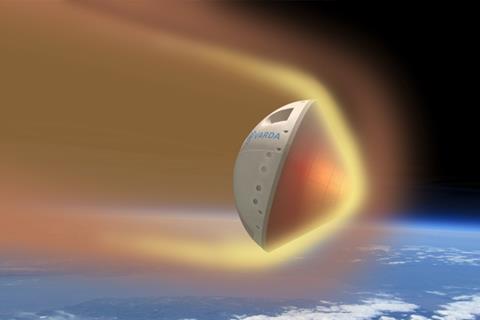Space-grown crystals of an antiviral drug have been brought to earth following the successful recovery of the capsule from Varda Space Industries’ W-1 mission.

The capsule landed in northern Utah on February 21, making Varda the third company to recover an intact spacecraft from orbit.
The W-1 capsule contained the materials necessary to grow crystals of Ritonavir, an antiviral drug used to treat HIV and hepatitis C. Pharmaceuticals are one of the high-value products that could potentially help spark and nurture the off-Earth manufacturing industry.
Off-Earth manufacturing
Varda hopes to be a major player in off-Earth manufacturing, a production option that offers some intriguing advantages, according to the company.
“Processing materials in microgravity, or the near-weightless conditions found in space, offers a unique environment not available through terrestrial processing,” Varda’s website states. “These benefits primarily stem from the lack of convection and sedimentation forces, as well as the ability to form more perfect structures due to the absence of gravitational stresses.”
Varda’s 3-foot-wide (0.9 meters) conical capsule — integrated into a Rocket Lab Photon spacecraft, which provided power, propulsion, navigation and other services — lifted off in June 2023 on SpaceX’s Transporter-8 rideshare mission.
Successful touchdown
Rocket Lab USA Inc conducted in-space operations, deorbit, and reentry positioning maneuvers for the spacecraft, enabling Varda’s reentry capsule and payload of pharmaceutical crystals to return to Earth. With Rocket Lab’s role in the mission complete, the Varda team then took over management of the capsule’s hypersonic reentry, parachute deployment, and touchdown in the designated zone at the Utah Test and Training Range (UTTR) near Salt Lake City shortly after 21:30 UTC.
Rocket Lab said that while initially designed for a four-month lifespan on orbit, the mission timeline was more than doubled with its spacecraft successfully providing power, communications, ground control, and attitude control to Varda’s capsule on orbit for more than eight months. This enabled Varda’s capsule to grow Ritonavir crystals, commonly used in antiviral medication. As particles function differently when no longer under the force of gravity, Varda’s capsule utilizes microgravity conditions in space to formulate a range of pharmaceutical products.
Space experiment
Just a week after Transporter-8’s liftoff, Varda announced that its crystal-growing experiment had worked.
“Over the last day, for the first time ever, orbital drug processing happened outside of a government-run space station. Our crystallization of Ritonavir appears to have been nominal. This is our first step in commercializing microgravity and building an industrial park in LEO [low Earth orbit],” the company said in a June 30 post on Twitter, now X.
Following touchdown, the company added in a post on X: ”From here, our capsule will be transported back to our facilities in Los Angeles for post-mission analysis.
“The Ritonavir vials onboard the spacecraft will be shipped to our collaborators Improved Pharma for post-flight characterization,” Varda added. “Additionally, data collected throughout the entirety of the capsule’s flight — including a portion where we reached hypersonic speeds — will be shared with the Air Force and NASA under a contract Varda has with those agencies.”
Phenomenal feat
Peter Beck, Rocket Lab founder and CEO, says: “This mission was a phenomenal feat and impressive display of teamwork between the Rocket Lab and Varda teams to develop a unique and highly capable spacecraft, successfully demonstrate in-space manufacturing, and bring back the capsule and finished pharmaceutical product – all on the first attempt.
”Being part of the first pharmaceutical in-space mission to happen outside of the International Space Station is immensely exciting and we look forward to building on this success with more Rocket Lab spacecraft in development for Varda right now. The success of this reentry mission will also inform our work on developing a reentry capsule for Neutron to potentially enable human spaceflight missions.”
First of four
This returned mission is the first of four Rocket Lab spacecraft ordered by Varda to support its in-space pharmaceutical processing. The remaining spacecraft are currently undergoing assembly, integration, and testing at Rocket Lab’s spacecraft production facility in Long Beach, California, with the next spacecraft scheduled to launch before the end of the year.
These spacecraft for Varda are just some of the 25+ spacecraft currently under development at Rocket Lab’s advanced spacecraft development and manufacturing complex, which features a 10,000 sq. ft. cleanroom and 40,000 sq. ft. of production & test facilities designed to support constellation class manufacturing and satellite assembly, integration and test for commercial, civil and national security customers.







No comments yet